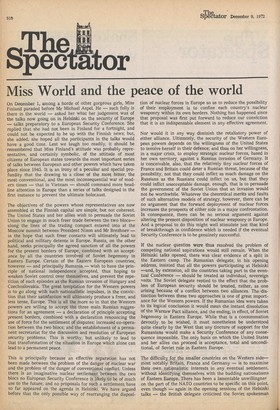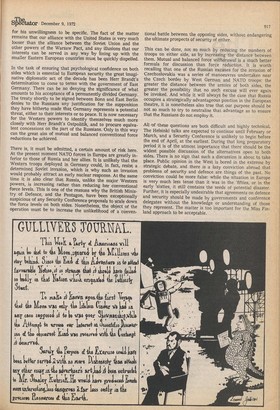Miss World and the peace of the world On December
1, among a horde of other gorgeous girls, Miss Finland paraded before Mr Michael Aspel. He — such folly is there in the world — asked her what her judgement was of the talks now going on in Helsinki on the security of Europe — talks preparatory to a European Security Conference. She replied that she had not been in Finland for a fortnight, and could not be expected to be up with the Finnish news; but, she added, she hoped all the participants in the talks would have a good time. Lest we laugh too readily, it should be remembered that Miss Finland's attitude was probably representative, and certainly symbolic, of the attitude of most citizens of European states towards the most important series of talks between European and other powers which 'have taken place since 1945. It is an irony of a peculiar and special profundity that the drawing to a close of the most bitter, the most conventional, and the most inconsequential war of modern times — that in Vietnam — should command more headline attention in Europe than a series of talks designed in the first instance to prevent the ultimate holocaust.
The objectives of the powers whose representatives are now assembled at the Finnish capital are simple, but not coherent. The United States and her allies wish to persuade the Soviet Union to engage in much freer trade between the two blocs— along the lines of the trading compact entered into at the Moscow summit between President Nixon and Mr Brezhnev — in the hope that such freer contacts will ultimately lead to political and military detente in Europe. Russia, on the other hand, seeks principally the agreed sanction of all the powers for the present borders of Europe, combined with an acceptance by all the countries involved of Soviet hegemony in Eastern Europe. Certain of the Eastern European countries, however — and principally Rumania — wish to have the principle of national independence 'accepted, thus 'hoping to weaken Soviet control over themselves, and 'prevent the repetition of such episodes as the Russian invasion of Hungary and Czechoslovakia. The great temptation for the Western powers is 'to go along with such nationalistic impulses, in the conviction that their satisfaction will ultimately produce a freer, and less tense, Europe. This is all the more so in that the Western powers are willing to accept the three main Russian suggestions for an agreement — a declaration of principle accepting present borders, combined with 'a declaration renouncing the use of force for the settlement of disputes; increased co-operation between the two blocs; 'and the establishment of a permanent secretariat for the discussion and resolution of European security problems. This is worthy, but unlikely to lead to that transformation of the situation in Europe which alone can lead to a permanent peace.
This is principally because an effective separation has rick been made between the problem of the danger of nuclear war and the problem of the danger of conventional conflict. Unless there is an imaginative nuclear settlement between the two blocs no European Security Conference is likely to be of much use to the future; and no proposals for such a settlement have so far appeared on the agenda in Helsinki. We have argued before that the only possible way of rearranging the disposi tion of nuclear forces in 'Europe so 'as to reduce the possibility of their employment is to confine each country's nuclear weaponry within its own borders. Nothing has happened since that proposal was first put forward to reduce our conviction that it is an indispensable element in any effective agreement. Nor would it in any way diminish the retaliatory power of either alliance. Ultimately, the security of the Western European powers depends on the willingness of the United States to 'involve 'herself in 'their defence; and thus on her willingness, in a major crisis, to employ strategic nuclear forces, based in her own territory, against a Russian invasion of Germany. It is 'conceivable, also, that the relatively tiny nuclear forces of France and Britain could deter a Russian threat, because of the possibility, not that they could inflict 'a's much damage on the Russians as the Russians could inflict on us, but that they could inflict unacceptable damage, enough, that is to persuade the government of the Soviet Union that an invasion would not be worthwhile. Whatever the theoretical merits and faults of such 'alternative models of strategy, 'however, there can be no argument that the forward deployment of nuclear forces increases the prospects of either side in a major confrontation. In 'consequence, there can be no serious argument against altering the present disposition of nuclear weaponry in Europe. And a proposal to do this might well stimulate just that kind of breakthrough in confidence which is needed if the eventual Security Conference is to be genuinely successful. If the nuclear question were thus resolved the problem of competing national aspirations would still remain. When the Helsinki talks opened, there was clear evidence of 'a split in the Eastern camp. The Rumanian delegate, in 'his opening address, insisted that all the powers 'participating at Helsinki --and, by extension, all the countries taking part in the eventual Conference — should be treated as individual, sovereign units. The Soviet delegate replied to the effect that the problem of European security should be treated, rather, as one arising because of a conflict between two alliances. The distinction between these two approaches is one of great importance for the Western powers. If the Rumanian idea were taken to its logical conclusion it would mean the instant dissolution of the Warsaw 'Pact alliance, and the ending, in effect, of Soviet hegemony in Eastern Europe. While that is a 'consummation devoutly to be wished, it must nonetheless be understood quite clearly by the West that any tincture of support for the Rumanians would make a Security Conference of any consequence impossible. The only basis on 'Which the United States and her allies can proceed is acceptance, total and unconditional, of Soviet rule in 'Eastern Europe. The difficulty for the smaller countries on the Western side— most notably Britain, France and Germany — is to maximise their own nationalistic interests in any eventual settlement, without identifying themselves with the budding nationalisms of Eastern 'Europe. There has been a lamentable unwillingnes on the part of the NATO countries to be specific on this point, even though — again in the opening sessions of the Helsinki talks — the British delegate criticised the Soviet spokesman for his unwillingness to be specific. The fact of the matter remains that our alliance with the United States is very much looser than the alliance between the Soviet Union and the other powers of the Warsaw Pact, and any illusions that our interests can be served in any way by lining up with the smaller Eastern European countries must be quickly dispelled.
In the task of ensuring that psychological confidence on both sides which is essential to European security the great imaginative diplomatic act of the decade has been Herr Brandt's determination to come to terms with the government of 'East Germany. There can be no denying the 'significance of what amounts to his acceptance of a permanently divided Germany. The treaty 'shortly to be signed between Bonn and East Berlin denies 'to the 'Russians 'any justification for the supposition they have hitherto made that Germany represents a potential threat, either to their interests or to peace. It is now necessary for 'the Western powers to identify themselves much more closely with Herr Brandt's Ostpolitik, and to procure equivalent concessions on the part 'of the Russians. Only in this way can the great aim of mutual 'and balanced conventional force reductions be achieved.
There is, it must be admitted, a certain amount of risk here. At the present moment NA'PO forces in 'Europe 'are greatly inferior to those 'of Russia 'and her 'allies. 'It is unlikely that the Western troops deployed in Germany could, in fatt, resist a determined Soviet invasion, which is why such an invasion would probably attract an early nuclear response. At the same time it is also clear 'that Russia, unlike the major Western powers, is increasing rather than reducing her conventional force 'levels. This is one of the reasons why the British Ministry of Defence, and the Pentagon, have been exceptionally suspicious of any Security Conference proposals to stale down the 'force levels on both 'sides. Nonetheless, the object of the operation must be to increaSe the unlikelihood of 'a tonven tional battle between 'the opposing sides, without endangering the ultimate prospects of security of either.
This can be done, not so much by reducing the numbers of troops 'on either side, as by increasing the distance between them. Mutual and balanced force withdrawal is a much better formula for discussion than force reduction. It is worth recalling 'that one of the Russian 'excuses 'for the invasion of Czechoslovakia was a series of 'manoeuvres undertaken near the Czech border by West German and NATO troops: the greater the distance between the armies of both sides, the greater the possibility that no such excuse will ever again be invoked. And while it will always be the case that Russia 'occupies a 'strategically advantageous position in the European theatre, it is nonetheless also true that our purpose should be not so much to try to neutralise that advantage as to ensure that the Russians do not employ it.
All .of these questions are both difficult and highly technical. The Helsinki talks are expected to' continue until February or March, 'and a Security Conference is unlikely to begin before the end of April, at the earliest. During that long preparatory period it is of the utmost importance that there should be the 'widest possible discussion of the 'alternatives open to both sides. There is no sign that such a discussion is .about to take place. Public opinion in the West is bored in the extreme by strategic debate, and there is a lazy conviction abroad that problems of security and defence are things of the past. No conviction could be more false: while the situation in Europe is very much less tense than it was in the 'fifties, or in the early 'sixties, it still Contains the seeds of potential disaster. Further, it is especially undesirable that agreements on defence and 'security should be made by governments and conference delegates without the knowledge or understanding of those they represent. The matter is too important for the Miss Finland approach to 'be acteptable.











































 Previous page
Previous page